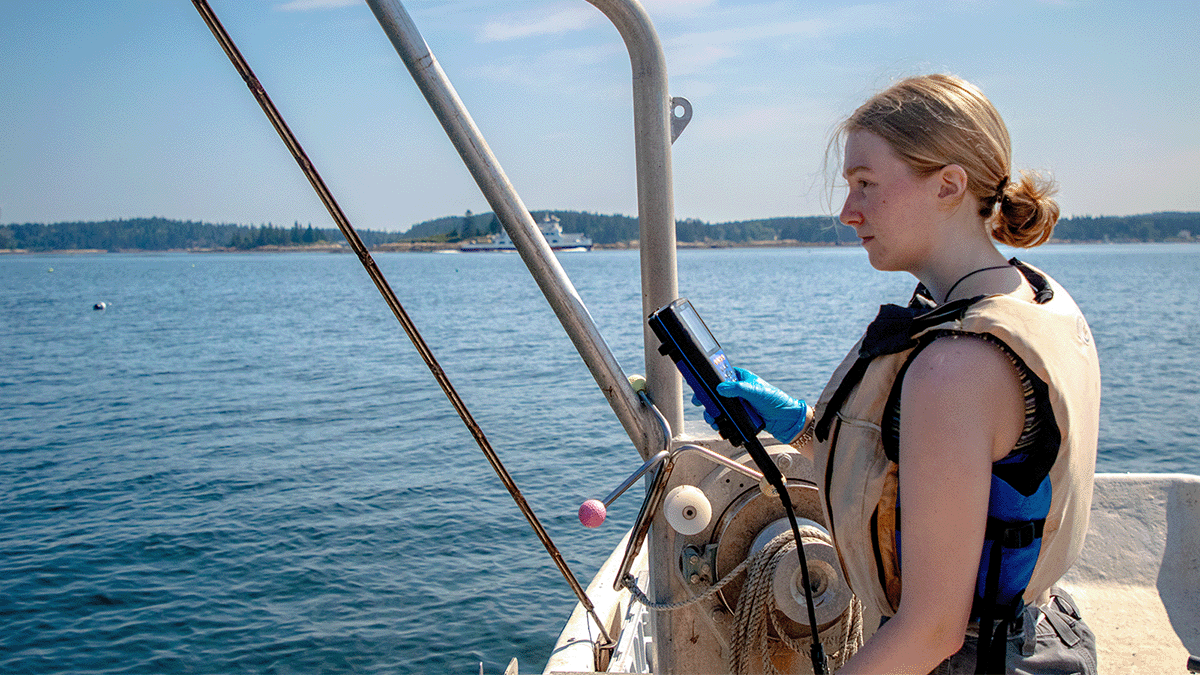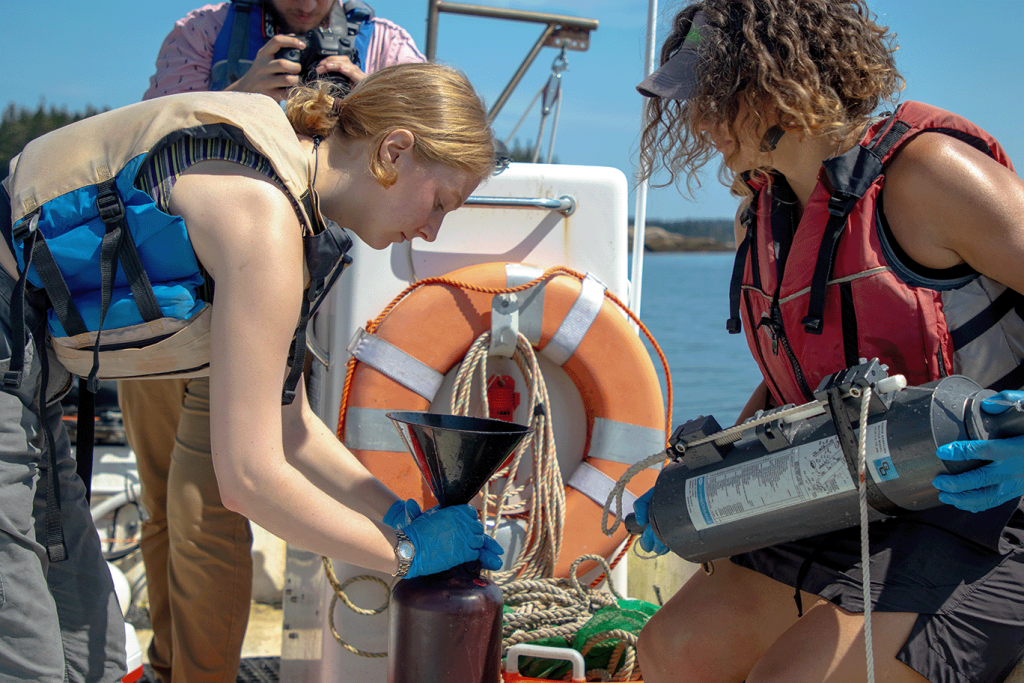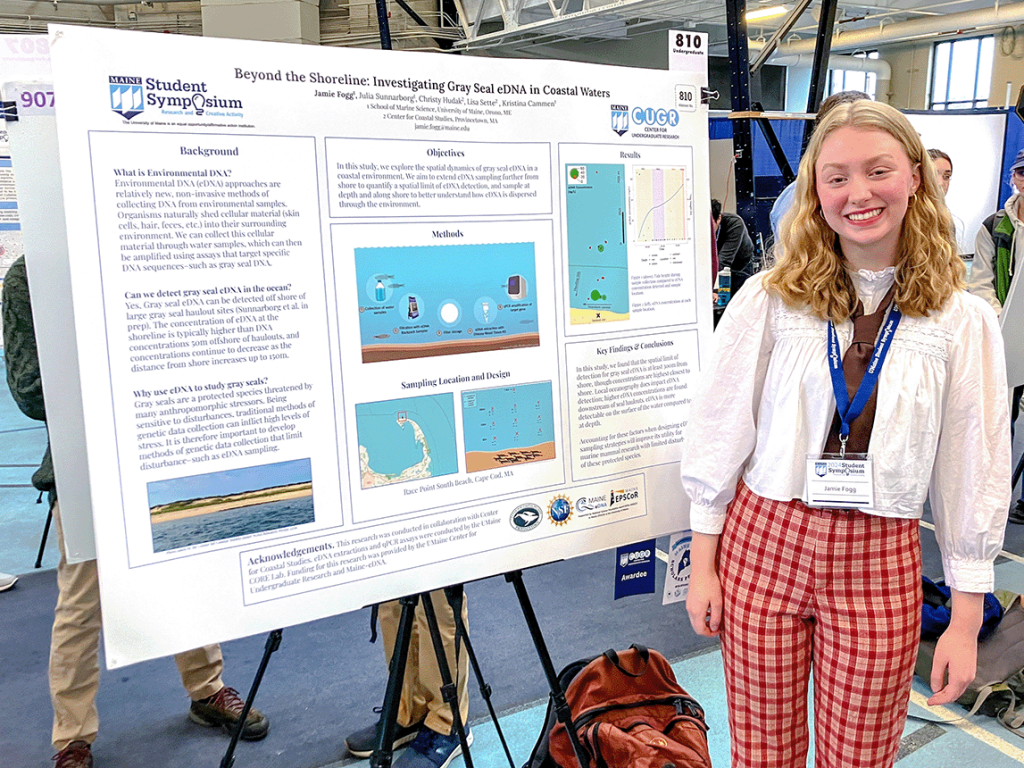
Investigating marine biology and developing as a researcher through environmental DNA
By Camryn Sudimick
In the vast expanse of the Earth’s ocean, our planet’s largest ecosystem, lie countless mysteries that have yet to be explored. Dedicated to uncovering such mysteries is Jamie Fogg, a sophomore studying Marine Science at the University of Maine.
Fogg began exploring marine biology during high school when she was involved in a program that selected her to go to Mount Desert Rock and develop her own research project. She documented wounded seals and presented her research at the Maine Science Fair, where she was awarded the Maine Top Scholar Award.
She was introduced to the world of environmental DNA (eDNA) during her first year at UMaine under the mentorship of Kristina Cammen, associate professor of marine mammal science. “I had no idea what eDNA was before,” Fogg explained. “But the Cammen Lab mostly focuses on utilizing genetics to understand marine ecosystems, and eDNA is a significant part of it.” In the Cammen Lab, Fogg has engaged in a diverse array of research activities, contributing her expertise to ongoing projects exploring various aspects of genetics and eDNA analysis for marine species.
Working in the lab opened the door to opportunities with the NSF EPSCoR RII Track-1 Maine-eDNA project. This past summer Fogg completed a Maine-eDNA internship that split her time between UMaine and Hurricane Island near Vinalhaven, Maine. In this position, she worked alongside Maine-eDNA Ph.D. Candidate Phoebe Jekielek, who aims to develop eDNA tools to help researchers better understand population dynamics, such as the reproductive and larval ecology of scallops, both in aquaculture and wild populations along the coast of Maine.
Fogg and Jekielek collected both physical plankton samples, as well as eDNA water samples. In the lab, they counted how many scallop larvae were present in the plankton samples, while also conducting eDNA extractions and then performing qPCR analysis from the extractions to detect and quantify the presence of scallop larvae DNA in the sample. By following this procedure, they will be able to compare the number of scallop larvae in the water, as determined by the plankton samples, with the results of the qPCR data, which allowed them to assess the accuracy of the eDNA analysis in detecting the presence of scallop larvae. In addition to the physical plankton samples and eDNA water samples, they collected environmental data, including water turbidity, temperature, depth, and other measurements. Fogg is currently finishing her scallop enumerations.
While their data analysis is not yet complete, Fogg emphasized the potential implications of the research findings. “I think a big part of this project’s goal is producing research that is tangible to local fishermen,” explained Fogg. Jekielek’s work is inspired by the emerging scallop aquaculture industry. Her goal is to use findings to engage with and better inform members of the aquaculture industry, to ensure the industry’s long-term sustainability and adaptability.
One dimension of this they are exploring is how different types of seabed substrates impact scallop spawning. “We compared samples from two distinct sites: a soft bottom area and a rocky bottom site,” Fogg explained. One of these areas was near an aquaculture farm, representing cultivated scallop beds, while the other resembled natural scallop habitats. This comparison allows them to gain valuable insights into the differences between aquaculture and natural environments and how they may impact scallop populations. These insights could range from variations in scallop growth rates to differences in shell density or nutrient availability. Such discoveries hold the potential to inform and enhance aquaculture practices.
Fogg’s Maine-eDNA internship has been a rewarding experience. She appreciates the hands-on learning experience and has developed new technical skills, and the experience led her to be more confident as a researcher. Fogg shared her personal growth experience, stating, “It has helped me really nail down that this is where I want to be, as well as visualize a future for myself in this field.” Fogg was the only Maine-eDNA intern assisting Jekielek in 2023, and while Jekielek is based at Hurricane Island, Fogg spent much of her summer stationed at the lab at UMaine. “Phoebe would come to the lab and teach me a protocol, such as how to do a DNA extraction, and then I would repeat it independently the next day,” Fogg explained. “That definitely helped me gain more independence, as well as confidence.”
In addition to her work with the Cammen Lab and Maine-eDNA, Fogg’s scholarly pursuits have been recognized with a prestigious grant from UMaine’s Center for Undergraduate Research (CUGR). Through her CUGR-funded research, Fogg is investigating the oceanographic aspects of marine ecology, with a specific focus on gray seal eDNA. She aims to determine the limitations of this technology for detecting the animals in coastal waters, facilitating the non-invasive monitoring of marine mammal populations. This research provides valuable insight into the conservation and management of marine ecosystems and the capabilities of eDNA technologies. “It is really cool how relatively new these methodologies are, and how we are still developing and improving them,” Fogg expressed. She finds herself drawn toward eDNA because of its non-invasive factors, and she emphasizes its crucial role in revolutionizing environmental monitoring. Fogg recently presented her CUGR research at the University of Maine’s annual student symposium and achieved first place in the natural science category. Additionally, she has recently been awarded the NOAA Hollings Scholarship, which will provide further research opportunities. She expressed that her experiences with the Cammen Lab and Maine-eDNA have undoubtedly helped prepare her for this prestigious scholarship. As Fogg looks ahead to her journey in research, fueled by her fascination with marine ecosystems and the innovative potential of eDNA technologies, she envisions pursuing a Ph.D. and continuing to contribute to the advancement of marine science.


